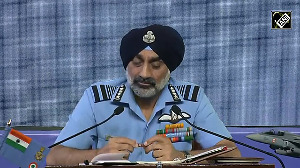The letter to the IAEA chief comes in handy to critics of the civilian nuclear deal who are likely to use it in the floor of the House to slam the accord. The signatories of the letter are known opponents of the deal and some have testified to this effect at Congressional hearings besides putting out statements.
They said in the letter that ElBaradei's support for creating exceptions to established rules and practices "betrays" two principled positions he has long advocated.
ElBaradei has argued for universal progress toward nuclear disarmament and against double standards for nuclear weapons haves and have-nots. However the US-Indian deal, they claimed, would provide India nuclear trade benefits reserved for countries that have forsworn nuclear weapons or those legally bound to give them up; neither of which is true of India.
"India is moving in the opposite direction," claimed the experts noting that under the proposed deal, the supply of foreign nuclear fuel to India "would, in fact, add to its nuclear weapons capability by freeing up its existing and limited domestic capacity to produce highly enriched uranium and plutonium exclusively for weapons."
The experts told ElBaradei that the deal "threatens to undermine the non-proliferation regime by granting India the benefits of civil nuclear commerce, while securing no meaningful constraint on the growth of India's nuclear weapons stockpile or requiring India to accept the equivalent of the non-proliferation obligations of Articles I and VI of the nuclear Nonproliferation Treaty."
"Given this reality, the limited amount of additional safeguards that India has pledged to accept does not limit India's nuclear weapons programme and significantly diminishes the concept of verification while placing an added burden on the already stretched resources of the IAEA" they added.
"Furthermore, your assertion that 'the US-Indian deal does not add to or detract from India's nuclear weapons programme, nor does it confer any status, legal or otherwise, on India as a possessor of nuclear weapons' is seriously misleading" the experts said.
"Preserving its nuclear weapons prerogatives was New Delhi's overarching objective in its negotiations on the nuclear trade deal with the United States. India's success is evident in a March 2 civilian-military separation plan that exempts eight current and future Indian thermal nuclear power reactors, the CIRUS research reactor, and its two existing fast-breeder reactors from safeguards," they noted.
The experts who signed the letter include Ralph Earle, former Director of US Arms Control and Disarmament Agency; John Holum, former Under Secretary of State for Arms Control and International Security Affairs; Daryl Kimbal of the Arms Control Association; Gary Milhollin of the Wisconsin Project on Nuclear Arms Control and Leonard Weiss; former Staff Director of the Senate Sub Committee on Energy and Nuclear Proliferation.
The letter said New Delhi was under no obligation to submit any future reactors it builds to international oversight and claimed India was building a plutonium reactor.
The experts said the deal "would effectively grant India highly sought-after access to nuclear technology and fuel only accorded to states in full compliance with global nonproliferation standards. It would also treat India in much the same way as the five original nuclear-weapon states."
"To help ensure that US civilian nuclear cooperation would not in any way assist India's weapons programme, it is essential that India fulfill... the pledge to 'assume the same responsibilities and practices as other leading countries with advanced nuclear technology, such as the US' by halting the production of fissile material for weapons purposes."
The experts claimed that India was seeking "an assured nuclear fuel supply" even if it were to break its unilateral test moratorium pledge."
They said the IAEA chief has overlooked that the deal "could also trigger a significant erosion of the guidelines of the 45-member Nuclear Suppliers Group, which are an important barrier against the transfer of nuclear material, equipment, and technologies for weapons purposes."
Noting that ElBaradei had argued for universal approaches to address dangers posed by nuclear weapons and against perpetuating double standards governing nuclear weapon haves and have-nots, they said, " creating far-reaching exemptions to international rules for India betrays these two principles, which you have tirelessly promoted."
"India should not be eligible for full international civil nuclear assistance until it meets core non-proliferation standards and practices expected of other states. It is surprising and disappointing that the IAEA director-general would suggest otherwise," they said.





